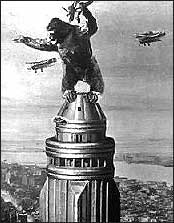Director John Carpenter, who creates and performs the music for almost all of his own films, agrees that the soundtrack should be implicit. ''[Y]ou shouldn't be aware of what I'm doing. Yeah, when it's scary or action-filled, you'll hear it, and it's fine. But you shouldn't be sitting there listening to music, or aware of it. It should be working on you. ... I don't want you to be aware ofthe technique. I just want you to feel it'' (Droney 118).
 Sometimes the composer does want you to be aware of his technique. The most obvious soundtrack technique, known as''mickeymousing,'' is just barely considered respectable by respectable film composers. Mickeymousing is when the music blatantly matches the action. When King Kong climbs the Empire State building, the music likewise rises and falls with each of his movements. In what has become a cliché, mickeymousing even has the music giving away the action about to happen(Bazelon 24). A heavy brass chord announces danger; a low, sustained tone creates mystery; sliding intervals of gliding strings imply seductiveness. This musical signal, that prepares the audience for the dramatic events to follow, is known as the stinger.
Sometimes the composer does want you to be aware of his technique. The most obvious soundtrack technique, known as''mickeymousing,'' is just barely considered respectable by respectable film composers. Mickeymousing is when the music blatantly matches the action. When King Kong climbs the Empire State building, the music likewise rises and falls with each of his movements. In what has become a cliché, mickeymousing even has the music giving away the action about to happen(Bazelon 24). A heavy brass chord announces danger; a low, sustained tone creates mystery; sliding intervals of gliding strings imply seductiveness. This musical signal, that prepares the audience for the dramatic events to follow, is known as the stinger. The modern audience has become sophisticated enough to be conscious of these musical cues. The recognition value of really
successful music like the Jaws and Psycho themes allows them to be parodied. James Homer's soundtrack for Aliens makes musical allusions toCapricorn One and Star Wars (Karlin 151), and it is parodied, in its turn, by Evil Dead III: Army of Darkness. In comedy films, composers can also use contrapuntal music that plays directly against the textual theme. WhenStanley Kubrick introduces the song ''Try a Little Tenderness'' to accompany two planes refueling in midair at the beginning of Dr. Strangelove, he makes a joke that contrasts with the dark and deadly implications of the rest of the film (Bazelon 112).
Source found of a article
No comments:
Post a Comment